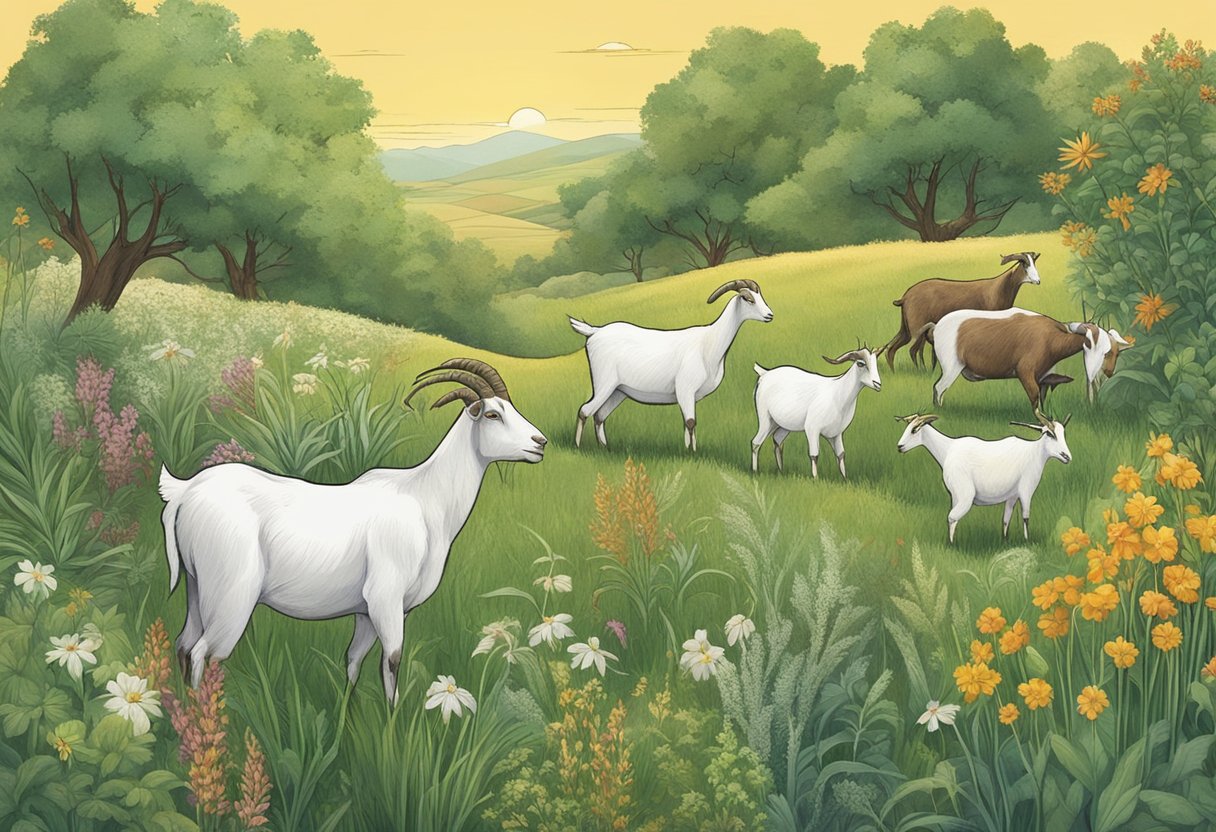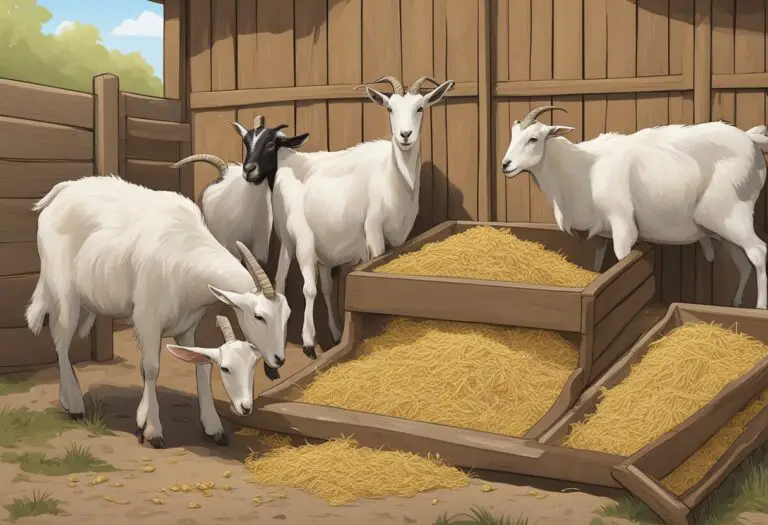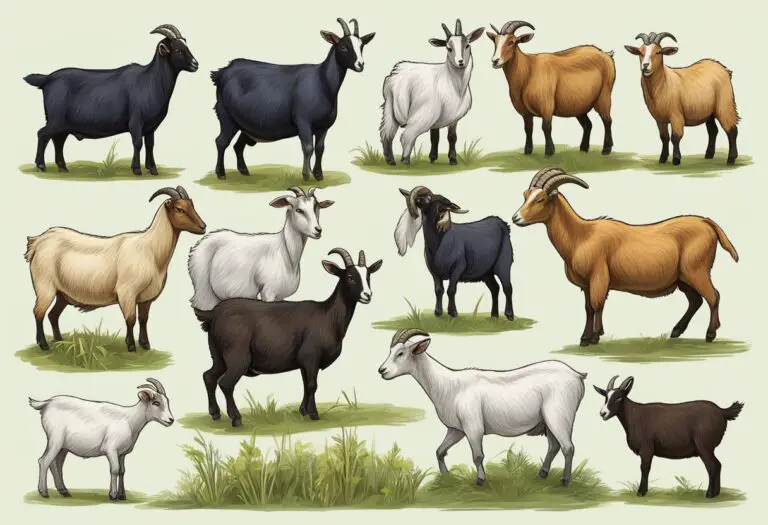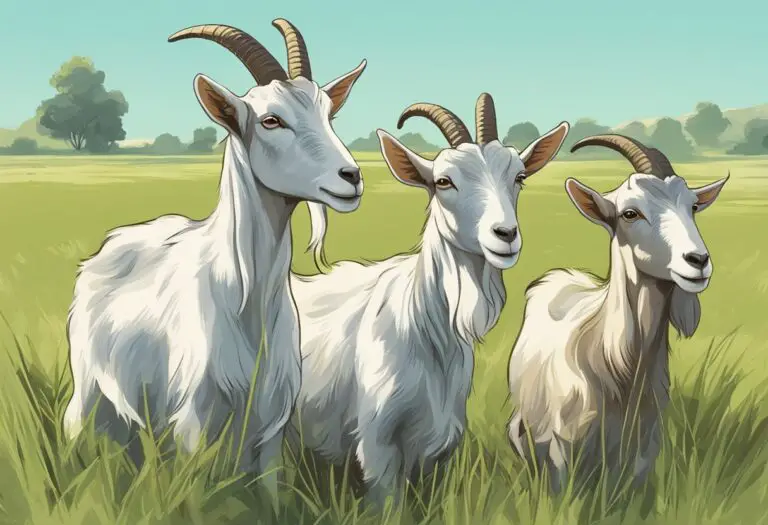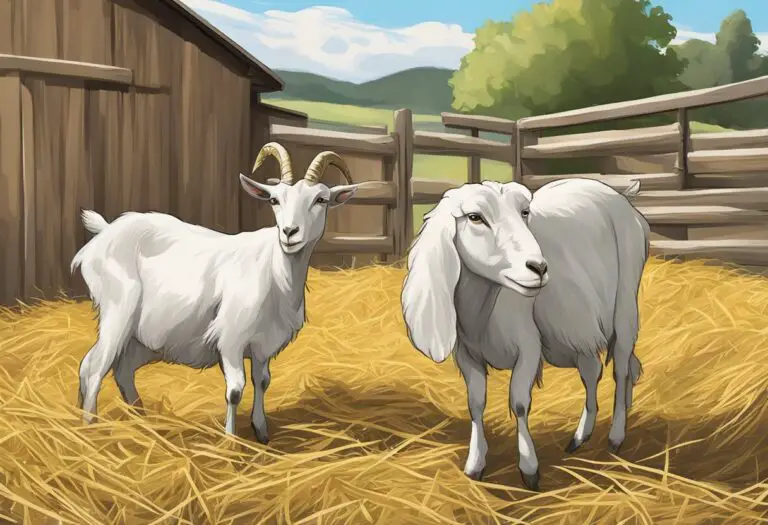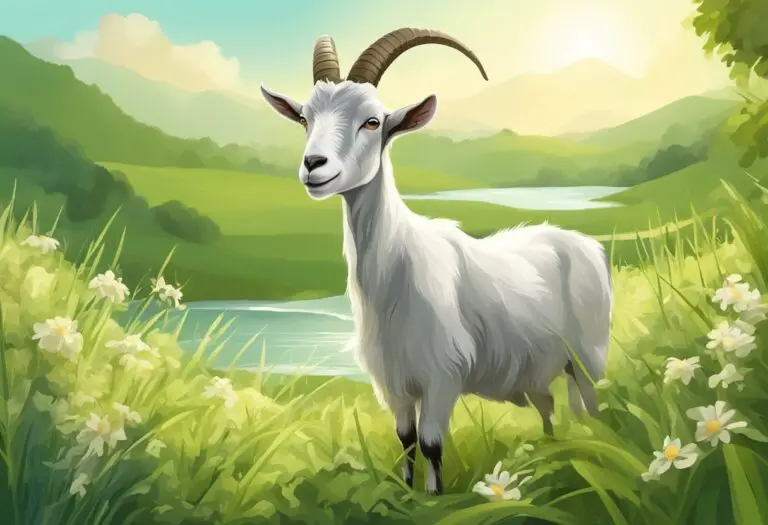Why Goats Need a Balanced Diet
Goats are known for their ability to survive in harsh environments and eat almost anything, but this does not mean that they don’t need a balanced diet. In fact, a balanced diet is essential for their health and well-being. A balanced diet for goats includes a variety of nutrients, including protein, carbohydrates, fats, vitamins, and minerals.
Protein is an essential nutrient for goats, as it helps to build and repair muscles and tissues. Carbohydrates provide energy, while fats help to maintain body temperature and provide a reserve of energy. Vitamins and minerals are also important for goats, as they help to support various bodily functions, including immune system function, bone health, and reproduction. Without a balanced diet, goats may be at risk of developing health problems, such as poor growth, weakened immune systems, and reproductive issues.
Importance of Balanced Diet in Goats

Goats are ruminant animals that require a balanced diet to maintain good health and productivity. A balanced diet is essential for goats because it provides them with the necessary nutrients to support their growth, reproduction, and milk production. A balanced diet also helps to prevent health problems such as metabolic disorders, digestive issues, and poor immune function.
A balanced diet for goats should contain a variety of nutrients, including carbohydrates, proteins, fats, vitamins, and minerals. Carbohydrates provide energy for goats, while proteins are essential for growth, reproduction, and milk production. Fats are also important for energy and help to maintain body temperature. Vitamins and minerals are necessary for various bodily functions, such as bone development, immune function, and reproduction.
A balanced diet for goats should also take into account their age, weight, and activity level. Young goats require more protein and energy to support their growth, while lactating goats need more energy and protein to support milk production. Mature goats require a diet that is lower in energy and protein to maintain their body weight.
In addition to a balanced diet, goats also require access to clean water and good quality forage. Forage provides goats with fiber, which is essential for digestive health. Goats should have access to forage throughout the day to maintain their digestive health and prevent digestive issues such as bloat.
Overall, a balanced diet is essential for goats to maintain good health and productivity. Providing goats with a diet that contains a variety of nutrients, taking into account their age, weight, and activity level, and providing access to clean water and good quality forage can help to prevent health problems and support their growth, reproduction, and milk production.
Nutritional Requirements

Goats, like all animals, require a balanced diet to maintain good health and productivity. A balanced diet for goats should contain the right amount of macronutrients, micronutrients, and water.
Macronutrients
Macronutrients are nutrients that are required in large amounts by goats. These nutrients include carbohydrates, proteins, and fats. Carbohydrates provide energy to goats, while proteins are essential for growth and repair of tissues. Fats provide energy and help in the absorption of fat-soluble vitamins.
A balanced diet for goats should contain 60-70% carbohydrates, 10-12% protein, and 3-4% fat. Some common sources of carbohydrates include hay, silage, and grains. Protein can be obtained from sources such as soybean meal, cottonseed meal, and alfalfa hay. Fats can be obtained from sources such as vegetable oil and animal fat.
Micronutrients
Micronutrients are nutrients that are required in small amounts by goats. These nutrients include vitamins and minerals. Vitamins are essential for the proper functioning of the body, while minerals are required for the formation of bones, teeth, and other tissues.
A balanced diet for goats should contain adequate amounts of vitamins and minerals. Some common sources of vitamins include green leafy vegetables, fruits, and fortified grains. Minerals can be obtained from sources such as salt, limestone, and bone meal.
Water Intake
Water is essential for all animals, including goats. A lack of water can lead to dehydration, which can cause serious health problems. A goat should consume approximately 1 gallon of water per day.
In conclusion, a balanced diet is essential for the health and productivity of goats. A diet that contains the right amount of macronutrients, micronutrients, and water will help ensure that goats remain healthy and productive.
Health Benefits of a Balanced Diet

Goats, like all animals, require a balanced diet to maintain good health and wellbeing. A balanced diet provides the necessary nutrients, vitamins, and minerals that goats need to stay healthy and productive. A diet that is deficient in any of these essential nutrients can lead to a range of health problems, including poor growth, reproductive issues, and increased susceptibility to disease.
Disease Prevention
A balanced diet is essential for disease prevention in goats. A diet that is deficient in certain nutrients can weaken the immune system, making goats more susceptible to infections and diseases. For example, a lack of vitamin E and selenium can lead to white muscle disease, a condition that affects the muscles and can be fatal in young goats. A diet that is deficient in copper can lead to anemia, while a lack of zinc can cause skin disorders and poor wound healing.
Growth and Reproduction
A balanced diet is also important for the growth and reproduction of goats. A diet that is deficient in protein, energy, or minerals can lead to poor growth rates and reduced fertility. For example, a lack of calcium and phosphorus can lead to weak bones and poor growth in young goats, while a lack of energy can result in reduced milk production in lactating goats. A diet that is deficient in zinc can also lead to reduced fertility in male goats.
Longevity and Quality of Life
A balanced diet can help to ensure that goats live long and healthy lives. A diet that is deficient in essential nutrients can lead to a range of health problems that can affect the quality of life of goats. For example, a lack of vitamin A can lead to poor vision and increased susceptibility to respiratory infections, while a lack of vitamin D can lead to rickets and poor bone development. A balanced diet that provides all the necessary nutrients can help to ensure that goats live long, healthy, and productive lives.
In conclusion, a balanced diet is essential for the health and wellbeing of goats. A diet that is deficient in essential nutrients can lead to a range of health problems that can affect growth, reproduction, and disease resistance. By providing a balanced diet that meets all the nutritional requirements of goats, owners can help to ensure that their animals live long, healthy, and productive lives.
Feeding Practices

Goats require a balanced diet to maintain good health and productivity. A balanced diet provides all the essential nutrients in the right proportions. The feeding practices for goats include foraging behavior, supplemental feeding, and dietary adjustments for life stages.
Foraging Behavior
Goats are natural foragers and prefer to browse on shrubs, trees, and weeds. They have a unique ability to select and consume a variety of plants, which allows them to meet their nutritional needs. Foraging behavior is an essential part of a goat’s diet, and it provides them with fiber, minerals, and vitamins that are not available in commercial feeds.
Supplemental Feeding
Supplemental feeding is necessary when forage is limited or of poor quality. Goats require a high-quality diet to maintain their health and productivity. Supplemental feeding can include hay, silage, and grain. It is important to provide the right amount of feed to avoid overfeeding or underfeeding, which can lead to health problems.
Dietary Adjustments for Life Stages
Dietary adjustments are necessary for goats at different life stages. For example, pregnant and lactating does require a higher level of nutrition to support their growing fetuses and milk production. Young goats, or kids, require a diet that is high in protein and energy to support their growth and development. It is important to adjust the diet according to the specific life stage to ensure the goat’s nutritional needs are met.
In conclusion, goats require a balanced diet to maintain good health and productivity. Foraging behavior is an essential part of their diet, and supplemental feeding and dietary adjustments are necessary to meet their nutritional needs. By providing a balanced diet, goat owners can ensure their goats lead healthy and productive lives.
Common Dietary Imbalances and Their Impacts

Deficiencies
Goats that do not receive a balanced diet may suffer from various deficiencies. For instance, a deficiency in protein can lead to poor growth, weight loss, and reduced milk production in lactating goats. The lack of energy in the diet can cause a decrease in body condition, reduced milk production, and even death in severe cases. Additionally, a deficiency in minerals like calcium, phosphorus, and magnesium can cause weak bones, poor growth, and muscle weakness.
Toxicities
In addition to deficiencies, goats can also suffer from toxicities due to an imbalanced diet. For instance, an excess of protein can lead to an accumulation of ammonia in the blood, which can cause neurological problems and even death. Similarly, an excess of minerals like copper, selenium, and vitamin D can cause toxicity and lead to liver damage, hair loss, and even death.
It is important to note that dietary imbalances can have long-term effects on the health and productivity of goats. Therefore, it is crucial to provide them with a balanced diet that meets their nutritional requirements.
Monitoring and Managing Goat Diets

Goats require a balanced diet to maintain good health and productivity. Monitoring and managing their diets is crucial to ensure that they receive the necessary nutrients and energy. Here are some essential factors to consider when monitoring and managing goat diets:
Body Condition Scoring
Body condition scoring is a useful tool for assessing the nutritional status of goats. It involves evaluating the amount of fat and muscle on the animal’s body. A score of 1 indicates emaciation, while a score of 5 indicates obesity. Ideally, goats should have a body condition score of 3, which means they are in good condition.
Feed Quality Assessment
It is essential to assess the quality of feed offered to goats regularly. Poor-quality feed can lead to nutritional deficiencies, which can affect the animal’s health and productivity. Feed quality can be assessed by analyzing the nutrient content, the presence of molds or toxins, and the physical characteristics of the feed.
Regular Health Check-Ups
Regular health check-ups are essential for maintaining the health and productivity of goats. During these check-ups, the veterinarian can assess the animal’s overall health, identify any nutritional deficiencies or health problems, and recommend appropriate treatment or dietary adjustments.
In conclusion, monitoring and managing goat diets is crucial to ensure that the animals receive a balanced diet and remain healthy and productive. By regularly assessing body condition, feed quality, and health status, goat farmers can make informed decisions about their animals’ dietary needs and make appropriate adjustments to their diets.

